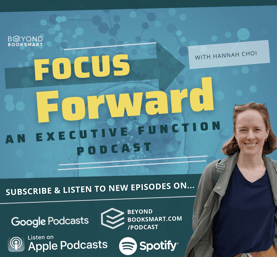By the time the semester hits mid-October, college and high-school students are really starting to get into the thick of the school year's demands. And although getting through all the deadlines successfully may seem most important, it's also critical to remember that burnout is real and emotional well-being is often more important than checking off another item on that to-do list.
Success and satisfaction in both school and life can be enriched by learning some coping skills to more effectively manage the stress and challenges of being a student. Jackie Wolfman, Ph.D.  was a guest on our Focus Forward podcast and shared some coping skills she teaches as a Dialectical Behavior Therapist. Dialectical Behavior Therapy is a type of therapy in which you learn to recognize certain negative or unhelpful thought patterns, and then challenge and change those patterns with strategies such as facing your fears and increasing your awareness of your own behaviors.
was a guest on our Focus Forward podcast and shared some coping skills she teaches as a Dialectical Behavior Therapist. Dialectical Behavior Therapy is a type of therapy in which you learn to recognize certain negative or unhelpful thought patterns, and then challenge and change those patterns with strategies such as facing your fears and increasing your awareness of your own behaviors.
The Executive Function skill of Metacognition goes hand in hand with this type of therapy. Using Metacognition, we learn about how we think, how our brains work, and why we do the things we do. As teenagers and young adults begin to explore and refine their own Metacognition, learning coping skills can be very beneficial and help deepen their understanding of themselves. Read on to find out more about these four skills, why they're so important, and how you can incorporate strategies that support and strengthen their practice.
Skill #1 - Mindfulness
Dr. Wolfman explains mindfulness as “your ability to focus your mind where you want it to go…Increasing awareness, both of what's going on around you [and] what's happening internally - your own thoughts and your own feelings.” Starting a mindfulness practice doesn’t have to be complicated or difficult. In fact, you’re most likely to be successful if you keep it simple. Dr. Wolman suggests paying attention to whatever sounds you notice for 30 to 60 seconds. You might notice some sounds, but you might also notice that you’re thinking about things other than the sounds you hear. Being able to train your brain to focus when you have a lot going on around you is a really useful skill for college students to learn. Mindfulness is a power player in all the coping skills shared by Dr. Wolfman.
Skill #2 - Interpersonal Effectiveness
Interpersonal effectiveness is an essential life skill that college students can practice. It involves knowing strategies for maintaining relationships, being able to ask for what we need, and being able to say “no”. According to Dr. Wolfman, interpersonal effectiveness really comes down to being able to identify and understand your own limits. She says, “Taking the risk to set [limits] can be very hard to practice, especially if we don't want to make people upset, or we're afraid people won't like us, or we just don't have practice doing that.” With all the demands that college students face, it can be really helpful to know how to communicate with others about their needs and what falls outside of their comfort zone.
Mindfulness comes into play with interpersonal effectiveness. If we practice paying attention to how we feel, it can help us identify what we need and the emotions we feel when interacting with others. College students can benefit from asking themselves, “How do I feel after spending time with this person?” Mindfulness can help us identify when we’ve reached our limit in any situation and need to say “no” or ask for help. Reaching out to teachers or friends to ask for help on academic work can be a lower-stakes opportunity to practice asking for help.
Skill #3 - Emotion Regulation
The third skill that Dr. Wolfman shared is emotion regulation or self-regulation. Dr. Wolfman explains that this skill helps us “identify emotions and really understand what they're doing there and what they're doing for you.” Once you understand your emotions and can name them, the next goal is to find some tools to help you manage the emotion. It’s beneficial to learn how to change the emotion by lessening the intensity or shortening how long you are feeling it. It’s also important to learn how to sit with your feelings and experience them. Dr. Wolfman says that emotion regulation is a “very important skill for college students who might get very overwhelmed by exam week, or things going on socially, or conflict with family or whatever they might be dealing with.”
An emotion regulation strategy that is taught in DBT sessions is called “opposite action”. First, you figure out what you’re feeling. If this is a feeling that you want to change, you identify the “action urge”, which is what the emotion is telling you to do. Once you figure out the urge, you then identify the opposite action and you do that instead. If you’re feeling very sad and you just want to crawl under the covers, you would muster up the courage and energy to get out of your dorm room and go interact with people. Dr. Wolfman says that there will be times when you want to sit with your feelings and it’s okay to crawl under the covers. But, she says, if the goal is to change them, then you do the opposite and get out there.
Skill #4 - Distress Tolerance
The fourth skill is called distress tolerance, which is having the skills to handle a crisis or a really challenging situation where you can't solve the problem right away. Distress tolerance helps you stop doing something that would make the situation worse. In these kinds of situations, we can distract ourselves with something or do something that we know is self-soothing. You know you can't solve it at that moment, but as Dr. Wolfman says, these distress tolerance skills can help “prevent yourself from doing something impulsive or risky or not helpful…These are tools that can really help us to get through and even do well, in the most challenging situations.”
To learn more about these coping skills and how your high school and college student can benefit from learning them, check out our episode with Dr. Jackie Wolfman!
And remember: skill development doesn't happen overnight - It takes mindful effort and a steady commitment. Hopefully, these tips provide the foundation for a lifetime of better coping skills.
 Want more of Hannah? Then be sure to subscribe to Focus Forward -our podcast with dozens of episodes full of in-depth Executive Function support, interviews, and more. Subscribe to get notified when new episodes drop.
Want more of Hannah? Then be sure to subscribe to Focus Forward -our podcast with dozens of episodes full of in-depth Executive Function support, interviews, and more. Subscribe to get notified when new episodes drop.

